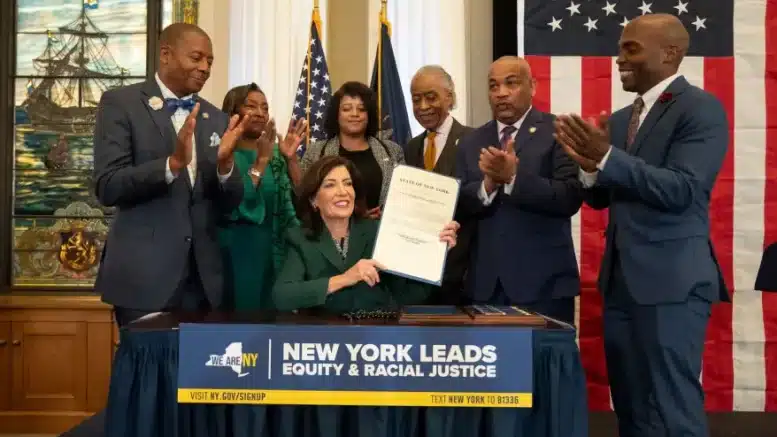Governor Hochul, Assembly Speaker Carl Heastie, and state Senate chief Andrea Stewart-Cousins recently announced their selections for the state’s “reparations” commission, marking the commencement of a process that is likely to exacerbate racial tensions in New York.
Formally known as the Community Commission on Reparations Remedies, the nine-member panel is tasked with examining the legacy of slavery, subsequent discrimination against people of African descent, and their ongoing impacts. It is expected to conduct public hearings and generate a report containing recommendations on reparations and racial justice remedies within a year.
This initiative comes on the heels of California’s reparations panel proposing payments ranging from $360,000 to $1.2 million for eligible “victims,” a proposition swiftly dismissed by Governor Gavin Newsom due to its staggering cost. Such endeavors, including New York’s, are inherently contentious as discussions around reparations often gravitate towards cash payments, simplifying a complex issue into a singular number.
While it’s important to confront the injustices of history, the notion that justice can be achieved solely through compensating for past wrongs is flawed. Aeschylus and Sophocles articulated this concept in the fifth century BC, emphasizing that mortal actions cannot rectify historical injustices. Focusing solely on past grievances undermines efforts to build a better future and perpetuates cycles of resentment and retribution.
Assemblywoman Michaelle Solages, sponsor of the bill establishing the commission, asserts that racial justice, rather than monetary reparations, will be the primary focus of the panel’s recommendations. However, the inclusion of “reparations” in the commission’s title suggests otherwise. Furthermore, the appointment of individuals like Dr. Ron Daniels, an advocate for comprehensive reparations for people of African descent, indicates a predisposition towards Coates’ divisive views, potentially hindering prospects for racial reconciliation.
New York abolished slavery in the early 19th century, making the pursuit of broad recompense for pre-abolition injustices impractical. Additionally, addressing the complexities of racism throughout history, including recent efforts such as affirmative action and minority support programs, presents significant challenges.
The state’s failure to address recent injustices, such as the mishandling of COVID-19 in nursing homes under former Governor Andrew Cuomo, highlights the commission’s misplaced priorities. Instead of fostering constructive dialogue and solutions, the commission risks further polarization and animosity.
As Coleman Hughes aptly noted, the proliferation of ideologies like Coates-ism and movements like Black Lives Matter has contributed to deteriorating race relations. Embracing a vision of a colorblind society, as advocated by Hughes, offers a more constructive path forward.
Lawmakers should prioritize tangible actions to uplift black communities, such as revisiting criminal justice reforms that have disproportionately impacted these communities. Ultimately, focusing on substantive measures rather than symbolic gestures is essential to fostering genuine progress and reconciliation.

